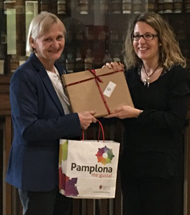"We have to be leaders in healthcare at work space wherever we are: in a hospital, in the university or in government."
Donna Wilson, professor and researcher at the University of Alberta, visit the School of Nursing at the University of Navarra.

PHOTO: Manuel Castells
Donna Wilson, professor and researcher from the University of Alberta (Canada) has visited the School of Nursing at the University of Navarra. Donna researches topics related to health services utilization and health policy, but mainly in relation to aging and end-of-life care. Her relationship with the University of Navarra began with the stay of our professor and researcher Begoña Errasti at the University of Alberta where they worked and published a high impact article in the journal Ageing Research Reviews.
You have come all the way from Canada to visit the University of Navarra, what brought you here?
One of the reasons I came to the University of Navarra is the relationship I established with Begoña during her stay. This is the power of working with so many people. When I met her at the University of Alberta, I could immediately appreciate her work and during the 6 months she was with us we learned from her and she was able to learn from us a lot. This university is fortunate enough to have a faculty stay abroad program that we found wonderful and would love to learn from.
You are a professor at the 4th best nursing School in the world, in your opinion, what does a nursing School need to be the best?
I think I would boil this down to two things: the people who make it up and the programs it has. At the University of Alberta we have a lot of people who do very well in their work and research programs with very strong publications. This gets noticed internationally and gives you a very good reputation. This reputation brings you very good students who come from all over the world to study at your university. Finally, I think that in the end the important thing is to take care of the people you have in your School.
You have worked in health policy in your country's government, why do you think it is important for nurses to be where the important decisions are made?
Yes, this has been a transition in nursing. When I started working nurses only worked in hospitals, at the bedside. But this is changing and little by little the idea is taking hold that we have the mission statement to maintain a healthy society and for this we have to be in decision-making bodies of hospitals, countries or organizations. We have to be leaders in health. To maintain a healthy society it is necessary to have money to invest in health promotion, in palliative care, for chronic processes... We need the voice of nursing to sound louder!
In addition to being in healthcare policy issues, you work on leadership projects with nurses. Could you explain what a nurse needs to be a leader in their field of work?
All nurses are equally important regardless of where they work and each one, therefore, has to be a leader in their work space. We are all, after all, working with people, with patients and families who need us to teach them, to inspire confidence in them. The same goes for those who are engaged in teaching with their students or those in government positions who have to make important decisions. At all levels of work there needs to be nurse leaders.
You and Begoña have published a high impact article , could you tell us about the importance of research in nursing?
Nursing has an important orientation to health promotion and we are trying to find a niche in research. We started to do research on the elderly and how society does not accept them. There is a fear of older people because they think they are going to be sick, that hospitals are going to be full, that it is going to cost a lot of money to maintain them... And governments are also afraid of all this. We wanted to find scientific evidence and data about this and we managed to publish it in Ageing Research Reviews and... it has been one of my best publications and one of the ones I am most proud of!
